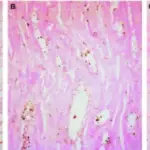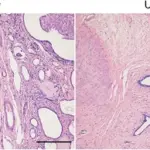Nephronophthisis is a group of advancing renal conditions usually having their onset in childhood.
What is the Pathology of Nephronophthisis?
The pathology of nephronophthisis is:
-Etiology: The cause of nephronophthisis is genetic factors.
-Genes involved: NPH1, NPH2, NPH3, MCKD1 and MCKD2.
-Pathogenesis: The sequence of events that lead to nephronophthisis results from autosomal dominant and recessive modes of inheritance. NPH1, NPH2, NPH3, describe the juvenile type of nephronophthisis and cause autosomal recessive disease while MCKD1 and MCKD2 describes medullary cystic disease that is characterized by progression to end stage kidney disease in adult life.
-Morphology: The morphology associated with nephronophthisis shows small kidney, granular surface and small cysts.
-Histology: The histology associated with nephronophthisis shows cysts lined by flattened or cuboidal epithelium. Presence of inflammatory cells and fibrous tissues.
How does Nephronophthisis Present?
Patients with nephronophthisis typically affect both genders equally present at age range of childhood. The symptoms, features, and clinical findings associated with nephronophthisis include polyuria, polydipsia, enuresis, dehydration, failure to thrive, weakness, and pallor.
How is Nephronophthisis Diagnosed?
Nephronophthisis is diagnosed by laboratory studies such as urinalysis, elevated serum BUN and creatinine concentrations, CBCs count, radiological studies such as plain radiograph, excretory urogram and CT scan.
How is Nephronophthisis Treated?
Nephronophthisis is treated through symptomatic management, renal replacement therapy- peritoneal, hemodialysis and kidney transplant.
What is the Prognosis of Nephronophthisis?
The prognosis of nephronophthisis is fair, ESRD develops in all patients with NPH.



